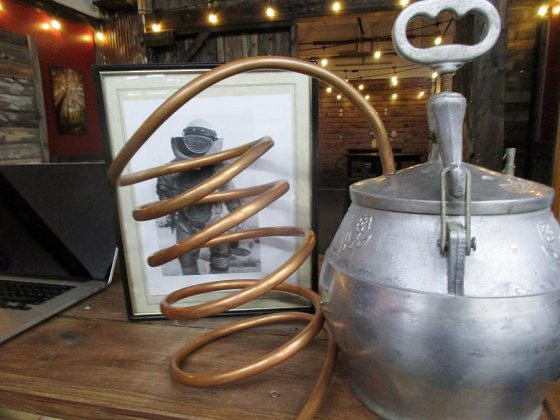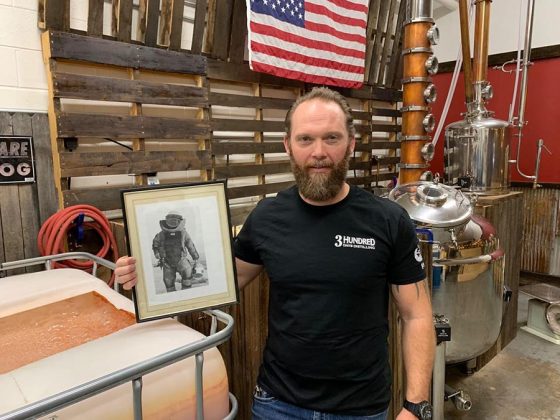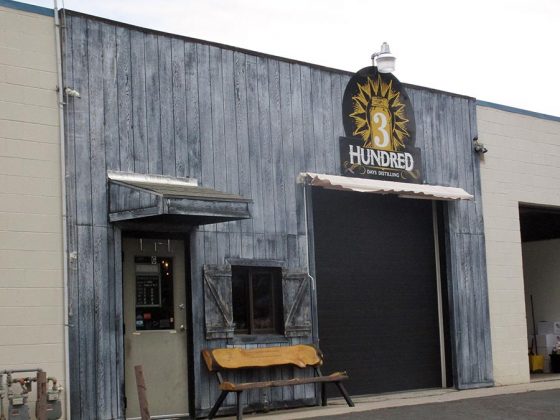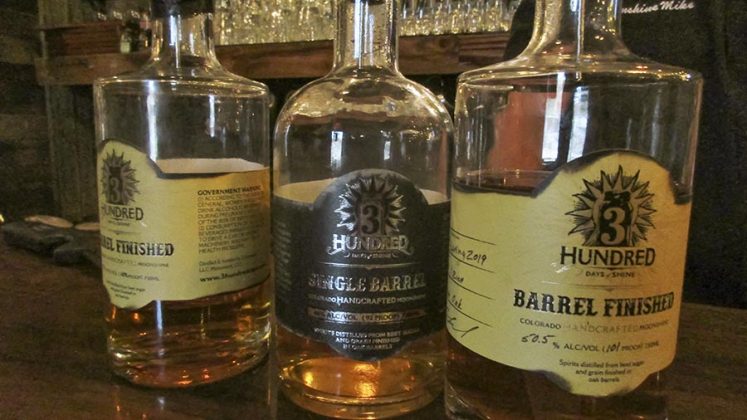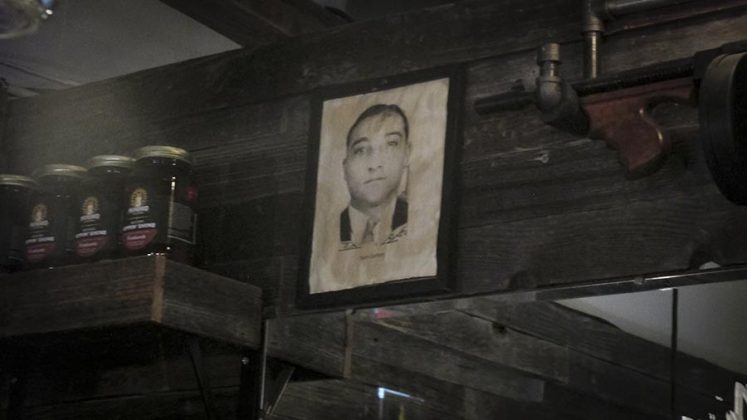Mike Girard first became interested in distilling through a nontraditional route: explosives.
As a former US Army Explosive Ordnance Disposal Technician (EOD) in Afghanistan in 2012, Girard found a way to re-forge swords of terrorism into ploughshares.
Girard took a pressure cooker, previously made into a bomb by an insurgent, and cleaned out the contents (likely a mixture containing ammonium nitrate and aluminum powder). With a hot plate and copper tubing salvaged from an HVAC system, he turned the pressure cooker into a still. Using some A&W root beer and yeast he’d bought online, Girard began putting to work the distillation chemistry he’d learned about in a military training course that covered how chemical weapons are made.
Girard says about his first run, “After about two hours, I started to see drips coming out of the worm, and I’ve been hooked on making moonshine liquor ever since.”
The distillate he made was too bitter to consume, but his liquid burned authentically blue. To make sure he was indeed on the right path, Girard put it into a laser spectrometer, also used by EODs in the field to test which chemicals are present within an explosive.
“It came out positive for ethanol,” he remembers happily ascertaining.
Colorado Moonshiner
In his previous job — which often required him to wear a weighty, stiflingly hot bomb suit (as seen in the 2008 film The Hurt Locker) — Girard learned how to neutralize improvised explosives so that they could be transported away from roadsides. Through his work in the field, he protected fellow soldiers, as well as civilians.
Today, he’s the founder of 3 Hundred Days of Shine in Monument, Colorado (located just north of Colorado Springs). As the name implies, the company specializes in moonshine.
But it’s not corn-based, Southern-style white lightning, Girard’s keen on pointing out. He says, “We make a traditional Colorado moonshine, meaning that it’s made from beet sugar… which was Colorado’s cash crop in the early 20th century.” Locals called it “sugar moon” — and that’s what Girard calls it today as well. Girard says that his Sugar Moon moonshine doesn’t have the after-bite or bitterness often found in corn-based products. It’s a Rocky Mountain-style mountain dew, affixed with a brand name that speaks to Colorado’s long-attributed number of sunny days per year.
Girard works a 130-gallon column still, with one of his original 26-gallon column stills serving as a doubler. (Above it hangs an American flag.) He proofs down the resulting 177-proof distillate to 105 proof for his Sugar Moon. Girard also infuses his moonshine with a variety of flavors. At 40 proof, there’s a Margarita-like drink, as well as a Rocky Mountain Sweet Tea and his ever popular Apple Pie. Another, at 100 proof, has the addition of Colorado honey, and it’s a favorite of Girard’s for improvising cocktails: “I don’t think there’s anything I haven’t mixed it with.”
Girard also makes sugar-based, barrel-finished moonshine, using wheat germ as a nutrient in the process — which lends the spirit a more grain-like flavor. (He uses tomato paste as a nutrient in the Sugar Moon — a “trade secret” that was until recently listed right on the bottle.) Girard’s top-of-the-line liquor spends over a year in two different types of barrels, which are passed along to Girard by Distillery 291 in Colorado Springs. “We put it in a bourbon barrel for ten months and then a rye barrel for an additional five,” Girard says of the whiskey-like spirit.
But although Girard’s a fan of whiskeys, the allure of moonshine captivated him early on. “Moonshine still had that outlaw draw to me,” says Girard. “And you can do everything with it. You aren’t hampered by the rules of whiskey. Whiskey has to be grain, aged a certain way. I’m still like, ‘Rules?! What rules?!’”
Second Career
Girard, now 47, owes his distillery’s existence to his moonshine making its way into the right hands at the right time.
When he got back from Afghanistan, Girard was stationed at Fort Carson, near Colorado Springs. Girard was coming up on his retirement after 23 years in the military. What to do next? Would he have to go back overseas as a civilian contractor, missing out on his grandkids’ youth? Or was there some kind of business he could start?
Girard gave a case of his moonshine to a friend, who works in the liquor business. He wanted to gauge his friend’s impression of the product. Impressed, his friend passed it along to his boss, who subsequently took it to the tailgate party happening before a Denver Broncos game. There, Girard’s moonshine got its big kickoff: It was sampled by three people who would ultimately become investors in Girard’s distillery. As Girard tells it, they became instant cheerleaders for his product. “They were doing backflips over it,” he says.
Tasting Therapy
Established in 2014, 3 Hundred Days of Shine is tucked away in the back of an industrially zoned building, behind a tire and auto shop.
Inside, the distillery’s tasting room resembles a roadhouse speakeasy. A non-working Thompson submachine gun hangs above the mirror-backed bar, and a small 1940s-era still sits higher above that. There are faded newspaper articles on the wall about the gangsters — the Carlino brothers out of Pueblo and Joe Roma of Denver, who waged war for control of the illicit liquor trade in the early 1930s. A self-described history buff, Girard says, “I love reading about Prohibition — what led up to it, and why it was such a failure.”
He also likes to share stories about the local moonshiner, Chester “Chet” Porter, who was arrested in Colorado Springs, three years after Prohibition ended, for running a massive, tax-avoiding operation. Girard references a newspaper article, hanging on one wall, about the authorities finding Porter’s still and around two tons of sugar at his active production site.
But there’s also wall space dedicated to Girard’s military service and to the EOD friends he lost in Iraq and Afghanistan. As he reminisces, his mood turns somber. These were brothers-in-arms, an extended family to his own wife and daughter. How does he come to terms with such loss? “It’s the life we signed up for,” reasons Girard. “Every one of them paid that price doing something that they loved doing.”
In addition to townsfolk — including some churchgoers who’ve been receptive to the distillery’s presence — Girard’s customers include retired military members living in the region. His tasting room serves an additional function for the vets, other than just serving them moonshine. “There’s an outlet here where you can talk with someone who’s been through the same thing,” says Girard. Speaking to his own PTSD, a condition which he shares with other vets, he says, “We all have our own demons.”
When he began 3 Hundred Days of Shine, Girard didn’t publicize his service in Iraq and Afghanistan, his EOD work or the fact that the company is veteran-owned. He was more inclined to introduce himself by saying, in an accent colored by his upbringing in rural Montana, “They call me ‘Moonshine Mike’ and I make a Colorado moonshine.”
Since then, he acknowledges, “Everybody wants to hear my story, I guess.”
During his years as an EOD tech, he says he was fortunate to never have a bomb detonate close enough to him to cause internal bleeding, ruptured eardrums, possibly death. But, issues with his back did qualify him for a medical discharge.
Now, Girard runs a family-based company with his wife, Jennifer, who manages the tasting room operations and scheduling, and his daughter, Paige, who oversees the processing operations. And, as much as possible, he hires vets to assist at the distillery.
“When I was in the military, I did something I loved to do,” says Girard. “And now I’m doing something I love to do, again. So, I’m pretty lucky.”

